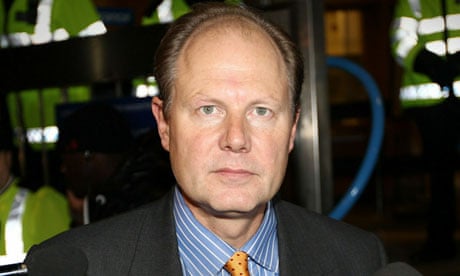Julian Assange's supporters have been ordered to forfeit £93,500 in bail money after the WikiLeaks founder sought political asylum in the Ecuadorean embassy in London.
A court ruled on Monday that the payments must be made within a month by nine friends and backers who in 2010 pledged £140,000 to guarantee Assange would abide by bail conditions during a failed legal challenge to extradition proceedings brought by authorities in Sweden, where he faces allegations of rape and sexual assault.
Vaughan Smith, the former British army captain who hosted Assange at his Norfolk home while he was on bail throughout 2011, and had promised to pay £20,000 if Assange skipped bail, was ordered to pay £12,000, while Philip Knightly, a veteran Australian investigative journalist who exposed the British traitor Kim Philby as a Russian spy, was ordered to pay £15,000, £5,000 less than he originally pledged.
Making the ruling at Westminster magistrates court, the chief magistrate, Howard Riddle, said he accepted that the sureties "acted in good faith", but said the system of sureties for defendants who want to remain at liberty would be undermined if cash was not forfeited.
"I accept that they trusted Mr Assange to surrender himself as required," he said. "I accept that they followed the proceedings and made necessary arrangements to remain in contact with him. However, they failed in their basic duty, to ensure his surrender."
Assange broke his bail conditions in June this year when he took refuge in the Ecuadorean embassy in Knightsbridge after he lost a supreme court challenge to the validity of the European arrest warrant that demanded his return to Sweden for questioning. He was due to be sent to Sweden within days when he took up residence in the diplomatic mission, where he was granted political asylum.
Assange's colleagues in the WikiLeaks organisation, Joseph Farrell and Sarah Harrison, were ordered to pay £3,500 each after originally pledging a combined £10,000. Sir John Sulston, a Nobel-prize-winning biologist, was ordered to pay £15,000 of the £20,000 he pledged. Tracy Worcester, a model turned environmental campaigner, had to pay £7,500 while Prof Tricia David, an educationalist, had to pay £10,000 of the £20,000 she promised. Caroline Michel, at one time Assange's literary agent, was ordered to pay £15,000 of the £20,000 she had promised.
The forfeitures came after the nine sureties last week pleaded for leniency in a statement to the court read out by Smith. He had argued the sureties were powerless over Assange's decision to evade a European arrest warrant because it had become an "unprecedented" matter of diplomatic and inter-governmental concern.
He also said they could not ignore the perceived risk that if Assange was extradited to Sweden he could end up in a US prison "under unjust conditions" and that to have urged Assange to give himself up would "render us mercenary and contemptible individuals of great weakness of character".
In his ruling, the chief magistrate said he understood this final point and took "some account of their integrity", but dismissed the argument that Assange feared that he would be subsequently extradited to the United States and even Guantánamo Bay.
"It is not new and should have been taken into account by the sureties when entering into and maintaining their obligations," he said.
"What is undoubtedly unique is that the defendant sought, and has apparently been granted, asylum by Ecuador," the chief magistrate said. "It was suggested that the defendant is simply seeking an alternative legal process. However, in principle I see no difference between seeking refuge in the Ecuadorean embassy, and taking flight to that country."
He accepted that it was different in that "this could take place without the need for travel documents, advanced flight arrangements and so on".
"Secondly," he agreed, "there remains the hope, expressed by all the sureties, that discussions between the relevant governments will lead to a solution, and in particular the solution of Mr Assange surrendering to the police here."
He said he also took account of the sureties' means.
"Professor David is a pensioner and the sum of £20,000 comprises a substantial portion of her savings jointly with her husband," he ruled.
"Sarah Saunders has also provided details of her financial position and I am satisfied that she is of comparatively limited means. Mr Vaughan Smith tells me that if he forfeits the £20,000 surety it will have a significant impact on the welfare of his family and his employees."
Smith said he was disappointed at the ruling and felt the sureties were being punished despite providing "a public service" in ensuring Assange met his bail conditions for 18 months until he entered the Ecuadorean embassy.
"We feel we've done our bit, but the ball has moved into another court now," he said. "We feel there are many in this country who are sympathetic."
He said he would have to borrow the money. "I rely on an income from a farm and from my journalism and I don't have £12,000 sitting in the bank," he said.
It is understood that a separate group of Assange supporters, thought to include the film-maker Ken Loach, the writer and campaigner Jemima Khan, the journalist John Pilger and the magazine publisher Felix Dennis have already forfeited bail cash worth £200,000 following a court order earlier this year.
